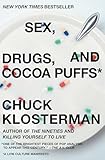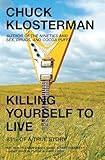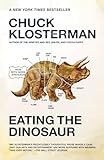
Chuck Klosterman is the king of pop culture. No other writer has evidently spent so much time having smart conversations about The White Stripes, “The Sims,” or U2. Books like Sex, Drugs, and Cocoa Puffs helped elevate discussions about pop culture from who’s sleeping with whom or fanboy arguments over which Pixies record is better, as Klosterman found esoteric connections between AC/DC and ABBA, or Nirvana’s In Utero and the Branch Davidian disaster. It was Klosterman’s odd, poignant observations that made me pick up Killing Yourself to Live in 2005 (that and the premise of visiting sites where rock stars died — I was kind of morbid then), and I still thank Blender for publishing a short review of the book. Books like this, or Eating the Dinosaur or Chuck Klosterman IV, made obsessing over pop culture cool. He deconstructs episodes of Saved by the Bell, dissects the importance of Morrissey to the Mexican community, and convinces people that heavy metal matters. Even his banter about sports was tolerable for the sports illiterate. I no longer had to feel embarrassed about caring more about what was happening in music and movies than about NASA’s latest discovery. The way Klosterman includes anecdotes from his life shows we’re all a little obsessed with pop culture, and that it’s okay.


 Six books later and he has me mulling over questions like what TV show will most represent life in the 21st century? Which musician will be the face of rock music? Will the multiverse theory sound more plausible? With But What if We’re Wrong? Thinking About the Present as if it Were the Past, Klosterman takes a break from dishing on pop culture to consider the way we will be remembered in the future, by people who view our present day as the past. I was skeptical when I first heard the concept of the new book and suspected that it would be complex and hard to follow, like his last book, a treatise on villainy called I Wear the Black Hat. Klosterman didn’t quell these fears by opening with “This is not a collection of essays.” And he’s sort of right. The book is more like a college research paper: he presents his argument, provides examples, and cites from interviews he’s held with people like Neil deGrasse Tyson and David Byrne in hope of bringing readers around to his brand of thinking. But even as he’s presenting complex scenarios, like why we don’t know everything about gravity or whether it’s possible our life is just a simulation, he brings the humor and wit prevalent in his writings on pop culture. And Klosterman can’t help but turn to pop culture to help clarify his arguments.
Six books later and he has me mulling over questions like what TV show will most represent life in the 21st century? Which musician will be the face of rock music? Will the multiverse theory sound more plausible? With But What if We’re Wrong? Thinking About the Present as if it Were the Past, Klosterman takes a break from dishing on pop culture to consider the way we will be remembered in the future, by people who view our present day as the past. I was skeptical when I first heard the concept of the new book and suspected that it would be complex and hard to follow, like his last book, a treatise on villainy called I Wear the Black Hat. Klosterman didn’t quell these fears by opening with “This is not a collection of essays.” And he’s sort of right. The book is more like a college research paper: he presents his argument, provides examples, and cites from interviews he’s held with people like Neil deGrasse Tyson and David Byrne in hope of bringing readers around to his brand of thinking. But even as he’s presenting complex scenarios, like why we don’t know everything about gravity or whether it’s possible our life is just a simulation, he brings the humor and wit prevalent in his writings on pop culture. And Klosterman can’t help but turn to pop culture to help clarify his arguments.
Though most of his arguments are well thought out and complete, there are a few that aren’t so clear. In the chapter “The Case Against Freedom,” Klosterman talks about how some parts of the Constitution and Declaration of Independence are outdated and how no efforts have been made to update them, bouncing from claims that Barack Obama is the greatest president to people having the right not to vote. These observations are interesting, but they feel like tangents distracting readers from the overall mission of the book. Meditations on the posthumous legacy of pro-wrestlers like Macho Man Randy Savage are witty and smart in Klosterman form, but difficult to relate back to his original argument. Even Klosterman seems concerned that we’ll lose the thread, and repeats the purpose of the book several times throughout.
Klosterman’s interviews with experts are a highlight of the book. He talks about how rock music will be remembered with Ryan Adams and asks Kathryn Schulz and Junot Díaz and George Saunders what kind of writers will be recognized in the future. His conversations with Neil deGrasse Tyson and string theorist Brian Greene prove to be fascinating, if creepy, measured discussions of whether life might be a simulation. The interviews balance out the book: it’s a testament to Klosterman’s credibility as an observer of modern life that he was able to loop in so many bright lights.
So what are his findings? For television, he throws readers for a loop, shunning “Golden Age of Television” shows like Breaking Bad and House of Cards for, of all things, Roseanne. The musician that will ultimately represent rock music is Chuck Berry and the writer that will be most remembered is someone totally unknown. His choices may seem jarring, but they make more sense as they’re unpacked. Roseanne wasn’t picked for the great writing; rather Klosterman feels it most represents our reality. The show’s family members didn’t look like they stepped out of a modeling agency, their house was often messy, and they weren’t afraid of bickering. Chuck Berry’s “Johnny B. Goode” is the epitome of rock ‘n’ roll; “simple, direct, rhythm-based music. Even John Lennon once said “If you tried to give rock and roll another name you might call it Chuck Berry.” And the writer who’ll be remembered in the future? Both Klosterman and Shultz argue it’ll most likely either be someone totally unknown or currently unappreciated, based on retroactive views on Moby-Dick and Anna Karenina. These conclusions don’t come easy. He goes through various choices for each and spends time working why they would and wouldn’t be appropriate, as if trying to convince himself.
Klosterman’s conclusions hold up pretty well. He attacks the argument from various angles and provides different examples to convince both readers and his interviewees. Some of his arguments are more well thought than others; though the Roseanne conclusion makes sense, Klosterman spends more time arguing why certain shows don’t make the cut than explaining his pick. He doesn’t address those who don’t see themselves represented by Roseanne or point out that, in the end, the show was all inside Roseanne’s head (bringing it back to Neil DeGrass Tyson!). As he talks through his choice, even he seems unconvinced, and ends the chapter defeated, saying he doesn’t know if he’s right at all. Nonetheless, the chapter is one of the most engaging in the book.
Though he may convince readers, he doesn’t always convince his peers. Both Ryan Adams and Jonathan Lethem disagree with his findings on Chuck Berry, with Adams arguing it’s not the inventor that matters, but rather “the symptom of the thing that was set in motion,” e.g., Twitter rather than Twitter’s creator. Kathryn Schulz actually seems to change Klosterman’s opinion regarding writers. He originally argued the writer to be remembered will be someone totally unknown until Shultz said “The likelihood that the greatest writer will be known but not fully appreciated?…That would be more like fifty-fifty,” at which point he beings to argue from her point of view. Often times Klosterman will play devil’s advocate to challenge the expert opinion; sometimes they’ll change their opinions, sometimes not. Klosterman allows himself to be swayed, and allows himself to be wrong. The ebb and flow of opinions shows how difficult Klosterman’s project is, and how charming a writer he can be.








